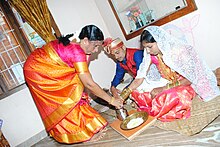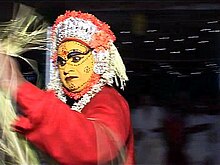 | |
| Total population | |
|---|---|
| c. 1.8 million | |
| Regions with significant populations | |
| 1,846,427 (2011 census)[1] | |
| Languages | |
| Tulu | |
| Religion | |
| Majority: Minority: [2] | |
| Related ethnic groups | |
| Pancha-Dravida, Dravidian, Kannadigas, Konkanis, Kodavas, Malayali[3] | |
| Person | Tuḷuva |
|---|---|
| People | Tuḷuvarŭ |
| Language | Tuḷu |
| Country | Tuḷu Nāḍŭ |
The Tulu people or Tuluvas are an ethno-linguistic and ethno-cultural group from Southern India. They are native speakers of the Tulu language and the region they traditionally inhabit is known as Tulu Nadu. This region comprises the districts of Dakshina Kannada and Udupi in Karnataka and part of Kasaragod district in Kerala,[4][5][unreliable source?] with Mangalore, Karnataka being the commercial hub. The Census report of 2011 reported a population of 1,846,427 native Tulu speakers living in India.[1]
Etymology[edit]
According to Keralolpathi, the name Tuluva comes from that of one of the Cheraman Perumal kings of Kerala, who fixed his residence in the northern portion of his dominions just before its separation from Kerala, and who was called Tulubhan Perumal.[3][better source needed]
Mythology[edit]
According to mythology, Tulu Nadu was reclaimed by Parashurama from the sea.[citation needed] According to the 17th-century Malayalam work Keralolpathi, the lands of Kerala and Tulu Nadu were recovered from the Arabian Sea by the axe-wielding warrior sage Parasurama, the sixth avatar of Vishnu (hence, Kerala is also called Parasurama Kshetram 'The Land of Parasurama'[6]). Parasurama threw his axe across the sea, and the water receded as far as it reached. According to legend, this new area of land extended from Gokarna to Kanyakumari.[7][better source needed] The land which rose from sea was filled with salt and unsuitable for habitation; so Parasurama invoked the Snake King Vasuki, who spat holy poison and converted the soil into fertile lush green land. Out of respect, Vasuki and all snakes were appointed as protectors and guardians of the land. P. T. Srinivasa Iyengar theorised, that Senguttuvan may have been inspired by the Parasurama legend, which was brought by early Aryan settlers.[8]
People and identity[edit]

Tulu speakers are divided into various sub-castes , such as Bunt, Billava, Devadiga, Kulalas, Koraga, Mogaveera are also Tulu speakers.[9] A Tulu woman is called Tuluvedi.[citation needed]
Culture[edit]



Tuluvas follow a matrilineal system of inheritance known as Aliyasantana, where inheritance is from uncle to nephew, except for Brahmins, Tulu Gowda, Shettigar caste and Vishwakarmas.[10] It is similar to the Marumakkathayam of Kerala.[11][12][13] Other distinctive features include the rituals of Yakshagana, Bhuta Kola, Nagaradhane[14] Aati kalenja and Kambala.[15] Bhuta Kola is similar to Theyyam in North Malabar region.[16][17]
Tuluva New Year is called Bisu Parba, which falls on the same day as Baisakhi, Vishu and the Thai New Year.[18]
Tuluva Paddanas are sung narratives, which are part of several closely related singing traditions in Tulu language, Paddanas are sung during occasions which describe the evolution of Tulu tribes and Tulu culture.[19]
Buta Kola[edit]
Bhuta-aradhana (lit. 'spirit worship' or 'soul worship'; a bhuta or bhoota is a supernatural creature, or spiritual entity, especially of ancestors)[20] in Tulu Nadu is similar to the rest of South India, though the bhutas and forms of worship differ. The kola or nema is the yearly ceremony celebrating the festival of bhutas. They have attained a godly status among some worshippers, mainly non-Brahmins, and even have their own bhuta-sthanas (a place of abode similar to temples). However, in many villages the Brahmins, who consider these spirits as their protectorates, conduct the yearly ceremonies.
Bhuta, who may be considered local deities, can be animistic as in Panjurli (boar) or Pili-bhuta (tiger). A second variety can be representatives of characters taken out of the Puranas like Bermer (Brahma), Lekkesiri (Raktesvari, Kali) or Vishnumurti. A third category is deified human beings like Gulige, Annappe, and Koti-Chananye. The fourth kind is strictly local characters like Male-Chandi (from the male-Nadu), Ullaldi (from Ullal), and Malaraye (from the Ghats). Then there are bhutas that provide comical relief during nemas, namely Marlu-Jumadi (crazy Jumadi) or Potte (mute–deaf demigod). Newer bhutas also have been added, like Posa-bhuta (new demigod), Vokku-Ballala, and Muttappe.[21][better source needed]
Demand for a Tulu Nadu state[edit]
From India's independence and following the reorganization of states, the Tuluvas have been demanding national language status for Tulu[22] and a separate state for themselves called Tulu Nadu ('land of Tuluvas'), based on their language and distinct culture. Though somewhat subdued for a while, this demand has grown stronger in recent years. Several organizations like the Tulu Rajya Horata Samiti have taken up the cause of the Tuluvas, and frequent meetings and demonstrations are held across towns in Tulunadu (such as Mangalore and Udupi) to voice their demands.[23][broken footnote][24][25]
Prominent Tuluvas[edit]
See also[edit]
References[edit]
- ^ a b "ABSTRACT OF SPEAKERS' STRENGTH OF LANGUAGES AND MOTHER TONGUES - 2011" (PDF). censusindia.gov.in. Indian Census 2011, Government of India. Retrieved 7 July 2018.
- ^ "Population by religion community – 2011". Census of India, 2011. The Registrar General & Census Commissioner, India. Archived from the original on 25 August 2015.
- ^ a b J. Sturrock (1894). Madras District Manuals - South Canara (Volume-I). Madras Government Press.
- ^ "Tulu". ethnologue.com.
- ^ "Tulu Nadu, Kasaragod, Kerala, India". Kerala Tourism. Retrieved 12 June 2017.
- ^ S.C. Bhatt, Gopal K. Bhargava (2006) "Land and People of Indian States and Union Territories: Volume 14.", p. 18
- ^ Aiya VN (1906). The Travancore State Manual. Travancore Government Press. pp. 210–12. Retrieved 12 November 2007.
- ^ Srinivisa Iyengar, P. T. (1929). History of the Tamils: From the Earliest Times to 600 A.D. Madras: Asian Educational Services. p. 515. ISBN 978-8120601451.
- ^ Shetty, Malavika (2010). Telling Stories: Language, Narrative, and Social Life (Identity building through Narratives on a Tulu Call-in Show). Georgetown University Press. pp. 95–108. ISBN 9781589016743.
- ^ Yogitha Shetty. "Ritualistic World of Tuluva: A Study of Tuluva Women and Siri possession cult". Retrieved 12 December 2010.
- ^ Toshie, Awaya (21 January 1989). "CiNii - Transformation of the Marumakkathayam System in Malabar: The Malabar Marriage Act, 1896 and the Nayar Tarawads". Eastern Studies. 77. ci.nii.ac.jp: 101–127, 10. Retrieved 9 March 2008.
- ^ Page 35-39 Kandamathu Kudumba Sangamam Published by K. K. N., Neyyattinkara, S. India 1995
- ^ Jeffrey in the Decline of Nayar Dominance in Travancore, See notes under C V Raman Pillai
- ^ "Nagapanchami Naadige Doodadu". Mangalorean.com. 18 August 2007. Retrieved 28 January 2008.
- ^ "Connecting with nature". Deccan Herald. 17 May 2010. Retrieved 20 May 2017.
- ^ "'Devakoothu'; the lone woman Theyyam in North Malabar". Mathrubhumi.
- ^ "Devakoothu: This year, Devakoothu gets a new face | Kozhikode News - Times of India". The Times of India. 23 December 2012.
- ^ "Star of Mysore". 14 April 2017. Retrieved 26 July 2017.
- ^ Peter J. Claus, "Variability in Tulu Padannas". Retrieved 2011-03-09.
- ^ "Bhuta Aradhana". Encyclopedia of Intangible Cultural Heritage. Asia InCH; Craft Revival Trust.
Invocation of the bhuta spirits that involves, in addition to daily worship, a periodic propitiation in the form of possession rituals
- ^ Neria H. Hebbar. "Tulu Nadu: The Land and its People".
- ^ "Demand in RS for official status to Tulu, Kodava languages". Daily News and Analysis.
- ^ Tulu Rajya Horata Samithi has urged that the region comprising Tulu speaking people should be given the status of a separate state."News headlines". daijiworld.com.
- ^ "Now the time has come for all Tulu natives to pressurize the union government with the demand for a separate Tulunadu state", said renowned Tulu litterateur and Yakshagana artiste Kudyady Vishwanath Rai."Beltangady: Litterateur Kudyady Vishwanath Rai Voices Need for Tulunadu State". daijiworld.com.
- ^ "Vedike demands separate Tulunadu State". The Hindu. November 2016.
Further reading[edit]
- S. Muhammad Hussain Nainar (1942), Tuhfat-al-Mujahidin: An Historical Work in The Arabic Language, University of Madras, ISBN 9789839154801
- J. Sturrock (1894), Madras District Manuals - South Canara (Volume-I), Madras Government Press
- Harold A. Stuart (1895), Madras District Manuals - South Canara (Volume-II), Madras Government Press
- Government of Madras (1905), Madras District Gazetteers: Statistical Appendix for South Canara District, Madras Government Press
- Government of Madras (1915), Madras District Gazetteers South Canara (Volume-II), Madras Government Press
- Government of Madras (1953), 1951 Census Handbook- South Canara District (PDF), Madras Government Press
- J. I. Arputhanathan (1955), South Kanara, The Nilgiris, Malabar and Coimbatore Districts (Village-wise Mother-tongue Data for Bilingual or Multilingual Taluks) (PDF), Madras Government Press
- Rajabhushanam, D. S. (1963), Statistical Atlas of the Madras State (1951) (PDF), Madras (Chennai): Director of Statistics, Government of Madras
External links[edit]
 Media related to Tulu people at Wikimedia Commons
Media related to Tulu people at Wikimedia Commons